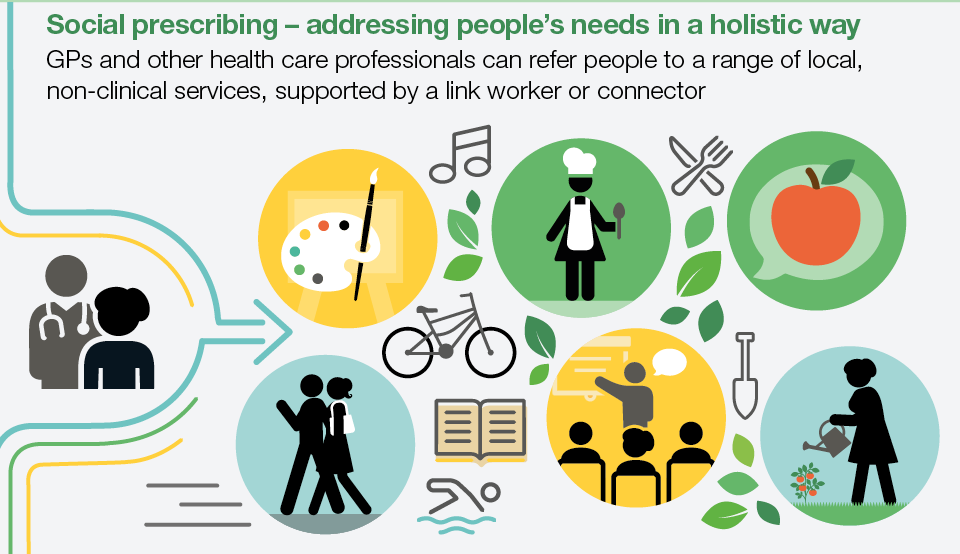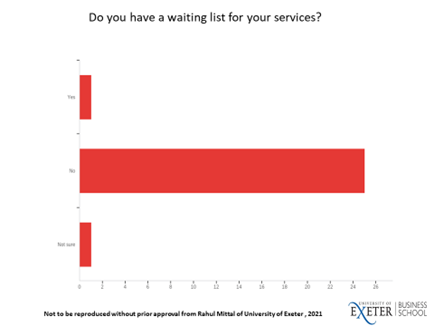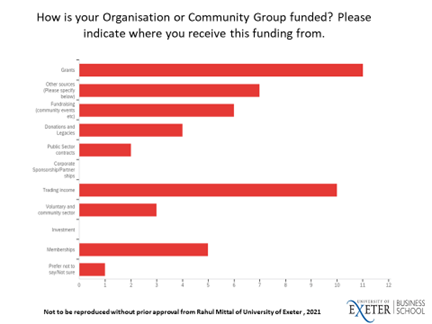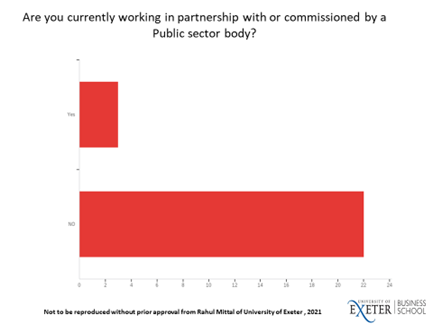Social Prescribing in Cornwall – growing the contribution of arts, culture and creativity

Social Prescribing is being rolled out rapidly nationally and across Cornwall, and for those of us who have been advocating for many years for non-clinical interventions to form an increasing part of the options available to primary care, it is a very welcome development.
A recent webinar in Cornwall demonstrated the value of social prescribing to people with a wide range of needs, but also highlighted some of the challenges with its rollout and integration with local communities going forward. Covid-19 has helped break down some of the barriers often encountered in relationships between the voluntary, community and social enterprise (VCSE) sector and statutory services, but more open and transparent conversations are still required to move the model forward especially in terms of achieving sustainability.
Our focus here is on the role of arts, culture and creativity, its value in improving health and wellbeing and what might be needed in Cornwall to ensure that the sector can grow its contribution to the social prescribing model.
There are a number of arts, creative and cultural activities available for social prescribers whether these are community activities in galleries and museums or groups run by freelance practitioners. What we are interested in is how these individuals and organisations can be better supported and how we can increase the number and range of opportunities available.
There is strong evidence for the value of the arts in improving health and wellbeing, both in terms of physical health and mental wellbeing. There have been a number of recent studies showing that there are many ways in which creativity can help boost wellbeing, including a major scoping study published by the World Health Organisation in 2019 which ‘identified a major role for the arts in the prevention of ill health, promotion of health, and management and treatment of illness across the lifespan.’
Research commissioned by the BBC and led by UCL (the Great British Creativity Test), with almost 50,000 people taking part, identified that there are three main ways in which creativity can benefit us:
As distraction, using creativity to avoid stress and anxiety
As contemplation, creativity as a tool to create space in the mind to reassess problems and make plans
As a means of self-development, building up confidence, self-esteem, problem-solving and coping skills
The research showed that benefits can come from a single session, but with increasing benefits from regular engagement. Taking part in live activities with others – singing in a choir or taking part in a community crafts group – are found to be best, but virtual experiences and working alone are also beneficial. And when facing particular challenges, creative activities are especially helpful.
More recent research, again by UCL as part of their ongoing Covid social study showed that people turned to arts, culture and creativity as a way of coping with the pandemic and early results indicate that these activities were the most protective factor for people’s mental wellbeing (over and above volunteering and physical exercise). This research is just the latest in a growing body of evidence for the benefits of arts and creativity on health and wellbeing. (And we should also acknowledge the amazing response by the creative sector during this pandemic, adapting what they do and developing new projects really quickly, to support individuals and communities, despite the massive challenges to livelihoods that the sector has experienced – just see the range of projects in Cornwall here.)
A detailed survey into Social Prescribing in Cornwall is being undertaken by Rahul Mittal, as part of his PhD work at University of Exeter Business School. He is interested in looking at the impact of Social Prescribing on local community and voluntary sector organisations. The survey was co-produced with various voluntary sector organisations to look into whether community groups were more resilient as a result of their involvement in social prescribing at local level and also look at their capacity to manage referrals and the support that they require to make Social Prescribing more sustainable especially in light of operating under the difficult circumstances of a global pandemic. The survey is still open so please contribute using the link below if you haven’t already done so.
https://uebs.eu.qualtrics.com/jfe/form/SV_39nNaYD0mmQXpCR
The interim analysis from the survey has highlighted that the long term future, finding suitable venues to deliver activities and funding remain the main barriers for freelance practitioners in the current climate. This is on the backdrop of the survey showing that the demand for such activities has grown in the last three years, and interestingly, that the vast majority of practitioners running these groups currently have no waiting lists for people to join, suggesting we have an untapped resource of expertise and skills that could be better utilised by social prescribers, given the evidenced benefits of this work.

But if this activity is to become an increasing aspect of the social prescribing landscape, what needs to happen? Firstly, we cannot escape the funding issue. At the moment, the model in Cornwall doesn’t provide central funding for the activities themselves so organisations and freelance practitioners have to source external funds to set up activities to which people can then be referred or self-refer. And they are incredibly successful at doing this, with income for freelance practitioners working in this field being split between a variety of sources.

But the time involved in applying for small pots of money, and the stop/start nature of activities as a consequence, is grossly inefficient and, we would argue, unfair, particularly for the small organisations and freelance creatives, who make up a huge proportion of the sector. If the NHS is benefitting from social prescribing, through reduced use of GPs/medication/other services etc.[i] then it seems reasonable that some of the financial savings are reinvested in the activities that contribute to that. The overwhelming majority of respondents to the survey indicated that they were not being commissioned by the public sector. Again this further highlights the need for more planning by statutory services to see how freelance practitioners, together with voluntary sector organisations, can play an even more significant role in delivering directly into communities in Cornwall. If appropriate support is put in place then it will help increase innovation through service delivery to the benefit of everyone involved.
[i] An evidence summary published by the University of Westminster suggests that where an individual has support through social prescribing, their GP consultations reduce by an average of 28% and A&E attendances by 24%.

But it’s not just funding that is needed.
Other support to practitioners delivering this work is also required, whether that is support in dealing with difficult situations or supporting people with complex needs; sharing ideas about good practice and what works; impact measurement; keeping up to date with the latest research and evidence and other forms of continuing professional development. Much of this can be delivered through peer support mechanisms, and at Arts Well we are keen to take forward such development, but they will require resourcing. The webinar poll on 29th January showed that funding and peer support were both high priorities for future consideration and further development.
The benefits are not just to the NHS but also to social care and other public sector services, so we would argue for social prescribing activities to be co-commissioned by the NHS and other commissioners. We all know the pressures on public sector budgets, particularly with this current crisis and its aftermath to manage, but a relatively small investment would make a big difference to the creative sector. Just 1% of the estimated savings to primary care alone would enable us to deliver a comprehensive arts activity offer in 20 locations across the whole of Cornwall all year round, including peer support and CPD for practitioners.
It is great to see social prescribing being embraced with such enthusiasm here in Cornwall, and there is real scope for a ‘win-win’ model of working whereby the considerable skills, expertise and experience of our creative practitioners, whose livelihoods have been so adversely affected by the restrictions of the last year, can be used to benefit the mental health and wellbeing of individuals and communities both now and in the future, but this will require addressing weaknesses in the current model.
We’ll be picking up other elements of this topic in future articles, so if you want to help us move this forward, please let us have your ideas.
Jayne Howard and Rahul Mittal